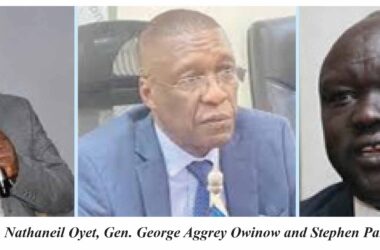By Charles K Mark
Sudan’s Sovereign Council Chairman Gen. Abdel Fattah Al-Burhan considers President Salva Kiir Mayardit as better mediator for resolving Sudan war.
Gen. Burhan declared his position on Monday after landing Juba for a meeting with South Sudan’s President Kiir on the Sudan crisis.
The visit to Juba was the second trip for the Sudanese military leaders out of his country after Egypt, since April 15, 2023, when conflict erupted in Khartoum.
In Egypt on Tuesday last week, Gen. Burhan held talks with President Abdel Fattah el-Sissi at a coastal city of El-Alamein.
Meanwhile, upon arrival in Juba, Sudanese Acting Foreign Affairs Minister, Ali al-Sadiq commended that South Sudan is the best mediator for the Sudan conflict.
“We in Sudan feel that South Sudan is the best country to meditate on the conflict in Sudan because we have been one country for so long and we know each other, we know the problems, and we know our needs,” Sadiq told the media.
However, South Sudan’s Minister of Cabinet Affairs, Dr. Martin Elia Lomuro said it was always in the interest of the country, to find a solution to the crisis in Sudan.
According to the minister, Salva Kiir is better placed to meditate on the problems in Sudan and that he has a solution at hands to resolve the conflict.
“It is known that President Kiir has intimacy and knowledge about Sudan and can find a solution to the crisis,” Dr. Lomuro said.
Gen. Burhan was accompanied to Juba, among others, by the head of the General Intelligence Authority, Gen. Ahmed Ibrahim Mufadel and other senior military officers.
In June, the Sudanese transitional military government, led by Gen. Al-Burhan, rejected the nomination of Kenyan President William Ruto to lead a dialogue on the country’s crisis.
Inter-Governmental Authority for Development (IGAD) and the heads of state and government had resolved at a summit in Djibouti that President Ruto lead a committee that would encompass the quartet—Ethiopia, Somalia, South Sudan, and Kenya—to champion peace talks in Sudan.
But in quick response to the landmark resolution, Khartoum demanded that South Sudan’s President, Salva Kiir be retained as chairman of the committee.
Fighting first broke out in the Sudanese capital Khartoum on April 15 between Sudan’s army and the Paramilitary Rapid Support Forces and has since exploded into open fighting in the capital Khartoum and elsewhere across the country.
A US-Saudi-led initiative was reportedly at the forefront of efforts seeking to end the war between the Sudanese Arm Forces (SAF), led by General Abdel Fattah Al-Burhan, and the paramilitary Rapid Support Forces (RSF), led by Mohamed Hamdan Dagalo (Hemedti).
Various regional and international actors, such as Egypt, the African Union (AU), the Intergovernmental Authority on Development (IGAD), and the tripartite mechanism (TPM), which involves the UN, the AU, and IGAD, have offered mediation efforts to end the clashes.
Gen. Dagalo was quoted by the BBC in a series of tweets saying that Gen. Burhan’s government were “radical Islamists” and that he and the RSF were “fighting for the people of Sudan to ensure the democratic progress for which they have so long yearned”.
Gen. Burhan said he supports the idea of returning to civilian rule but that he will only hand over power to an elected government.
There are suspicions that both generals want to hang on to their positions of power, unwilling to lose the wealth and influence that go with them.
Diplomats, who have played a crucial role in trying to urge a return to civilian rule, have been trying to find a way to get the two generals to talk.
The conflict is estimated to have killed at least 4,000 people, according to the U.N. human rights office, though activists and doctors on the ground say the toll is likely far higher.
More than 4.8 million people have been displaced, according to the U.N. migration agency. Those include over 3.8 million who fled to safer areas inside Sudan and more than 1 million others who crossed into neighboring countries.
On Monday, the United Nations and 64 other humanitarian agencies appealed for $1 billion to help over 1.8 million people expected to flee the war to five neighboring countries by the end of this year.




